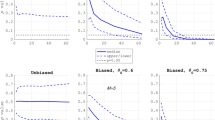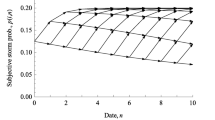Abstract
Climate change is an issue of risk management. The most important causes for concern are not the median projections of future climate change, but the low-probability, high-consequence impacts. Because the policy question is one of sequential decision making under uncertainty, we need not decide today what to do in the future. We need only to decide what to do today, and future decisions can be revised as we learn more.
In this study, we use a stochastic version of the DICE-99 model (Nordhaus WD, Boyer J (2000) Warming the world: economic models of global warming. MIT Press, Cambridge, MA, USA) to explore the effect of different rates of learning on the appropriate level of near-term policy. We show that the effect of learning depends strongly on whether one chooses efficiency (balancing costs and benefits) or cost-effectiveness (stabilizing at a given temperature change target) as the criterion for policy design. Then, we model endogenous learning by calculating posterior distributions of climate sensitivity from Bayesian updating, based on temperature changes that would be observed for a given true climate sensitivity and assumptions about errors, prior distributions, and the presence of additional uncertainties. We show that reducing uncertainty in climate uncertainty takes longer when there is also uncertainty in the rate of heat uptake by the ocean, unless additional observations are used, such as sea level rise.
Similar content being viewed by others
References
Andronova NG, Schlesinger ME (2001) Objective estimation of the probability density function for climate sensitivity. J Geophys Res-Atmos Res 106:22605–22611
Arrow KJ, Fisher AC (1974) Environmental Preservation, Uncertainty, and Irreversibility. Q J Econ 88:312–319
Baehr J, Keller K, Marotzke J (2007) Detecting potential changes in the meridional overturning circulation at 26°N in the Atlantic. Climatic Change, Published online: 10 January 2007 DOI 2010.1007/s10584-10006-19153-z
Brohan P, Kennedy JJ, Haris I, Tett SFB, Jones PD (2006) Uncertainty estimates in regional and global observed temperature changes: a new dataset from 1850. J Geophys Res 111:D12106
Church JA, Gregory JM, Huybrechts P, Kuhn M, Lambeck K, Nhuan MT, Qin D, Woodworth PL (2001) Changes in sea level,’ Chapter 11. In: Houghton JT, Ding Y, Griggs DJ, Noguer M, van der Linden PJ, Dai X, Maskell K, Johnson CA (eds) Climate change 2001: the scientific Basis. Contribution of Working Group I to the Third Assessment Report of the Intergovernmental Panel on Climate Change. Cambridge University Press, Cambridge, UK, p 881
European Council (2005) Presidency conclusions. European Council, Brussels
Folland CK, Karl TR, Christy JR, Clarke RA, Gruza GV, Jouzel J, Mann ME, Oerlemans J, Salinger MJ, Wang S-W (2001) Observed climate variability and change,’ Chapter 2. In: Houghton JT, Ding Y, Griggs DJ, Noguer M, van der Linden PJ, Dai X, Maskell K, Johnson CA (eds) Climate change 2001: The Scientific Basis Contribution of Working Group I to the Third Assessment Report of the Intergovernmental Panel on Climate Change. Cambridge University Press, Cambridge, UK, p 881
Forest CE, Allen MR, Sokolov AP, Stone PH (2001) Constraining climate model properties using optimal fingerprint detection methods. Clim Dyn 18:227–295
Forest CE, Stone PH, Sokolov AP, Allen MR, Webster MD (2002) Quantifying uncertainties in climate system properties with the use of recent climate observations. Science 295:113–117
Forest CE, Stone PH, Sokolov AP (2006) Estimated PDFs of climate system properties including natural and anthropogenic forcings. Geophys Res Lett 33(L01705):1–4
Ha-Duong M (1998) Quasi-option value and climate policy choices. Energy Econ 20:599–620
Henrion M, Fischoff B (1986) Assessing uncertainty in physical constants. Am J Phys 54(9):791–798
Jones PD, New M, Parker DE, Martin S, Rigor IG (1999) Surface air temperature and its variations over the last 150 years. Rev Geophys 37:173–199
Keller K, McInerney D (2007) The dynamics of learning about a climate threshold,’ Climate Dynamics, in review, available at: http://www.geosc.psu.edu/~kkeller/publications.html
Keller K, Bolker BM, Bradford DF (2004) Uncertain climate thresholds and optimal economic growth. J Environ Econ Manage 48:723–741
Keller K, Deutsch C, Hall MG, Bradford DF (2007) Early detection of changes in the North Atlantic meridional overturning circulation: Implications for the design of ocean observation systems. J Climate 20:145–157
Keller K, Kim S-R, Baehr J, Bradford DF, Oppenheimer M (2007) What is the economic value of information about climate thresholds? Chapter in: Integrated Assessment of Human Induced Climate Change, Chief Editor: Michael Schlesinger, Cambridge University Press, pp. 343–354
Kelly DL, Kolstad CD (1999) Bayesian learning, growth, and pollution. J Econ Dyn Control 23:491–518
Kolstad CD (1996) learning and stock effect in environmental regulation: the case of greenhouse gas emissions. J Environ Econ Manage 31:1–18
Leach AJ (2007) The climate change learning curve. J Econ Dyn Control 31(5):1728–1752
Manne AS, Richels RG (1995) The greenhouse debate: economic efficiency, burden sharing and hedging strategies. Energy J 16(4):1–37
Nordhaus WD (1994) Managing the global commons: the economics of climate change. MIT Press, Cambridge, MA, USA
Nordhaus WD, Boyer J (2000) Warming the world: economic models of global warming. MIT Press, Cambridge, MA, USA
Nordhaus WD, Popp D (1997) What is the value of scientific knowledge? An application to global warming using the PRICE Model. The Energy J 18(1):1–45
O’Neill B, Ermoliev Y, Ermolieva T (2006) Endogenous risks and learning in climate change decision analysis. In: Marti K, Ermoliev Y, Pflug G, Makovskii M (eds) Coping With Uncertainty: Modeling and Policy Issues. Springer Verlag, Berlin, pp 283–299
Oppenheimer M, O’Neill B, Webster MD (2008) Negative learning’ climatic change. Clim Change, (in press) DOI 10.1007/s10584-008-9405-1
Popp D (2004) ENTICE: endogenous technological change in the DICE model of global warming. J Environ Econ Manage 48:742–768
Prinn R, Jacoby H, Sokolov A, Wang C, Xiao X, Yang Z, Eckaus R, Stone P, Ellerman D, Melillo J, Fitzmaurice J, Kicklighter D, Holian G, Liu Y (1999) Integrated global system model for climate policy assessment: feedbacks and sensitivity studies. Clim Change 41(3–4):469–546
Rayner NA, Brohan P, Parker DE, Folland CK, Kennedy JJ, Vanicek M, Ansell T, Tett SFB (2006) Improved analyses of changes and uncertainties in marine temperature measured in situ since the mid-nineteenth century: the HadSST2 Dataset. J Climate 19:446–469
Rayner NA, Parker DE, Horton EB, Folland CK, Alexander LV, Rowell DP, Kent EC, Kaplan A (2003) Globally complete analyses of sea surface temperature, sea ice and night marine air temperature, 1871–2000. J Geophysical Research 108:4407
Sokolov A, Stone P (1998) A flexible climate model for use in integrated assessments. Clim Dyn 14:291–303
Toth FL, Bruckner T, Füssel H-M, Leimbach M, Petschel-Held G (2003) Integrated assessment of long-term climate policies: Part 1 – Model presentation. Clim Change 56(1–2):37–56
United Nations (1992) Framework Convention on Climate Change. International Legal Materials 31:849–873
U.S. Senate (2007) The low carbon economy act. Senate Draft Proposal. http://energy.senate.gov/public_new/_files/END07842_xml1.pdf
Wang C, Prinn RG (1999) Impact of emissions, chemistry and climate on atmospheric carbon monoxide: 100-year predictions from a global chemistry-climate model. Chemosphere Glob Chang Sci 1(1–3):73–81
Wang C, Prinn RG, Sokolov AP (1998) A global interactive chemistry and climate model: formulation and testing. J Geophys Res 103(D3):3399–3417
Webster MD (2002) The curious role of “learning” in climate policy: should we wait for more data? Energy J 23(2):97–119
Webster MD, Forest CE, Reilly JM, Babiker MH, Kicklighter DW, Mayer M, Prinn RG, Sarofim M, Sokolov AP, Stone PH, Wang C (2003) Uncertainty analysis of climate change and policy response. Clim Change 61(3):295–320
Yohe G, Andronova N, Schlesinger M (2004) To hedge or not against an uncertain climate future? Science 306:416–417
Zellner A, Tian GC (1964) Bayesian analysis of the regression model with autocorrelated errors. J Am Stat Assoc 59:763–778
Author information
Authors and Affiliations
Corresponding author
Rights and permissions
About this article
Cite this article
Webster, M., Jakobovits, L. & Norton, J. Learning about climate change and implications for near-term policy. Climatic Change 89, 67–85 (2008). https://doi.org/10.1007/s10584-008-9406-0
Received:
Accepted:
Published:
Issue Date:
DOI: https://doi.org/10.1007/s10584-008-9406-0




